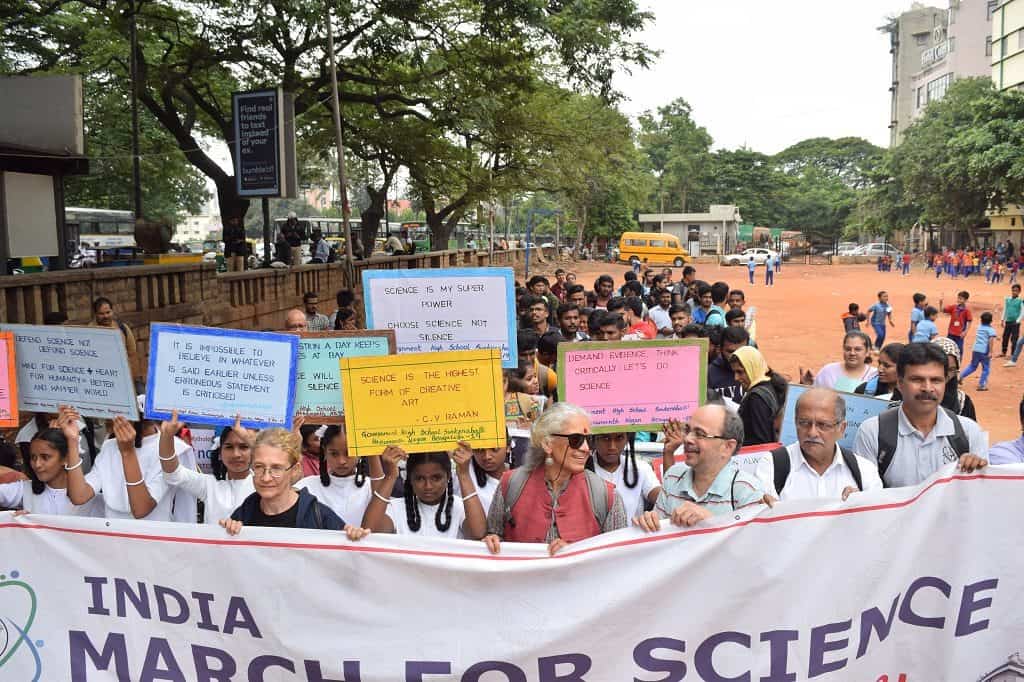The third edition of India March for Science (IMFS) was held here in Bengaluru today. The march intended to celebrate science and promote scientific temper. It also championed robustly-funded, publicly-communicated science as a pillar of human freedom and prosperity. Scientists, teachers, science communicators and science-loving public participated in the event.
The march began at 10.15 am at Banappa Park. About 200 people participated, holding posters of quotes from various scientists, slogans on celebrating science, and handmade sketches of scientists. Prof V Shivram, Registrar at Bengaluru Central University, flagged off the march, calling for the spread of science to all parts of the country.
Prof S Japhet, Vice Chancellor of Bengaluru Central University, inaugurated the convention and congratulated the organisers. He said that scientific temper should be part of not just the Constitution, but our lives.
He also said that we reap the benefits of science today only because of the dedication and sacrifices of many scientists who had given their lives, and stood by their ideals to give back to society. Prof Japhet also announced that the university was starting various science ideation forums to promote science and scientific temper.

Prof S Japhet, VC, Bengaluru Central University, inaugurated the convention
Retired astrophysicist Prof Prajval Shastry spoke of the role of scientists in promoting scientific temper. She said that many scientists themselves lacked scientific temper, but this was overlooked when they were hired. She insisted that scientific bent of mind must be inculcated at the grass root level by involving civil society.

The march inspired participation from scientists, teachers, students, science communicators and science-loving public
IP consultant Anil Jagalur moderated a discussion on water crisis at the convention. Prof T V Ramachandra of the Centre for Ecological Sciences, IISc, discussed how landscape dynamics was linked with hydrology, ecology, environment and social dimensions of riverine ecosystems.
Prof Ramachandra has worked on the rejuvenation of Bellandur and other lakes in the city. He said that the destruction of nature had led to floods and the depletion of water table in Bengaluru. He further emphasised the need for public-benefit science that would help society, and for action plans such as waste water treatment, prudent management of natural resources and building mini forests.
Prof Bhakti Devi, Visiting Professor at Bengaluru Central University, said that linear systems to regenerate water must be looked at, rather than centralised systems such as water harvesting. Linear systems offer a financially and socially feasible solution.
S Vishwanath, water conservation expert and adjunct faculty at Azim Premji University, spoke on the historical aspects and origins of water sources in India. He said that we must look for solutions that are sustainable with respect to groundwater use, and look at groundwater as a common pool resource rather than a private one.

About 200 people marched holding posters of quotes from various scientists, slogans on celebrating science, and handmade sketches of scientists.
Rajani K S, ex-HoD at the Department of Biology, Presidency College, thanked the organisers of the march who made the programme a success. She called upon the audience to be a part of the movement, to take it forward. She suggested starting science series across various institutions, and working with underprivileged children and slum residents to take science to common people. She also proposed to build a platform where individuals can contribute to working on solutions to research problems.
G Satish Kumar, senior principal software architect, gave the vote of thanks and read out messages from senior scientists. Prizes were distributed for the essay writing competition that was held as a precursor to the event.
[This article is based on a press release from